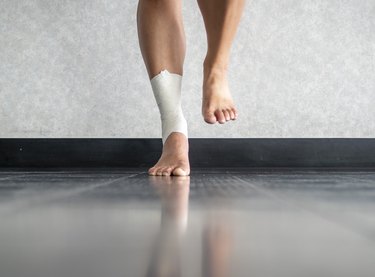
Noticing your foot turning inward when you're walking or running could mean that you are overpronating. Pronation of the feet to an excessive degree can potentially lead to lower leg injuries, according to a December 2014 analysis in theJournal of Foot and Ankle Research.
Fortunately, there are ways you can exercise to keep your ankles from turning inward and overpronating. Strengthening your feet and ankles could help preventankle sprains, falls and injuries due to overpronation.
Video of the Day
Foot Pronation Can Cause Injury
A June 2016 study inPhysical Therapy Rehabilitation Scienceshowed that people with pronated feet who havechronic ankle sprainscould benefit greatly from strength training the arch of the foot.
The study states thatankle sprainsaccount for 75 percent of all lower extremity injuries and are often related to foot pronation. What's more, having a foot turning inward causes inward rotation further up the leg. This can mean doing any activity where you are bearing weight puts you at more of a risk of falls and injuries.
Other problems can also result, such as plantar fasciitis, a painful condition in which there is inflammation in the connective tissue of your foot, resulting in stabbing sensations upon walking, according to theMayo Clinic. Patellofemoral pain can occur too, which causes pain around the knee cap, making it difficult to walk, run, jump or climb stairs, says theMayo Clinic.
Try Short Foot Muscle Training
The Physical Therapy Rehabilitation Science article recorded a study on 30 men and women who had pronated feet. They were randomly assigned to either a group performing a short foot exercise targeting the intrinsic muscles of the foot or a towel curl exercise. Intrinsic muscles of the feet are those that originate and insert in the foot and are responsible for fine motor actions such as toe movement.
The study participants performed the exercises for eight weeks, three times per day, for a total of 5 minutes each day. The participants were then given a test to assess changes in their arch and ankle stability.
The results of the study showed a significant improvement in both groups, but a more considerable increase was found in the group performing the intrinsic foot strengthening exercises.
This study is backed up by an October 2019 study in theJournal of Exercise Rehabilitation, which studied a group of 30 adults with chronic ankle instability, split into a group of intrinsic foot exercises or non-exercisers. The study lasted for six weeks, and muscle activation and dynamic balance improved significantly for the participants performing the intrinsic foot exercises.
Try the following exercise performed in the study, to help train and strengthen your intrinsic foot muscles:
- Stand or sit with your bare feet flat on the ground and press your first and fifth toe into the floor, extending your other toes. Hold for three seconds. Perform four sets of 15 repetitions.
- Extend your first toe, pressing the rest of your toes into the floor. Hold for eight seconds. Perform four sets of eight repetitions.
- Extend your second to fifth toes, pressing your first toe into the floor. Hold for 20 seconds. Perform four sets of three repetitions.
You can graduate from sitting to standing, then to standing on only one leg over time.
Improving Ankle Mobility and Stability
To help prevent your feet or a single foot turning inward, you can also perform these activities recommended by theAmerican Council on Exercisefor ankle strengthening. These activities will help to increase your ankle mobility and stability, preventing pronation and resulting injuries.
- Foam rollingyour hamstring and calf muscles.
- Stretching your hamstring and calf muscles.
- Contracting the arch of your foot for five to 10 seconds for five to 10 repetitions.
- Picking up a towel with your toes and bringing it towards you to strengthen your arch.
- Performing single-leg exercises as part of your workout routine.
Another option may be to use anti-pronation footwear. A small May 2019 study inPLOS Oneof 26 female runners observed that anti-pronation shoes helped prevent pronation when the runners were not fatigued. Check with your healthcare provider to see if anti-pronation footwear is right for you.
- Journal of Foot and Ankle Research: "Foot Posture as a Risk Factor for Lower Limb Overuse Injury: A Systematic Review and Meta-Analysis"
- Physical Therapy Rehabilitation Science: "The Effect of Intrinsic Foot Muscle Training on Medial Longitudinal Arch and Ankle Stability in Patients With Chronic Ankle Sprain Accompanied by Foot Pronation"
- Mayo Clinic: "Plantar Fascitis"
- 运动康复杂志》:“的影响6-Week Intrinsic Foot Muscle Exercise Program on the Functions of Intrinsic Foot Muscle and Dynamic Balance in Patients With Chronic Ankle Instability"
- American Council on Exercise: "Strengthen Your Ankles With These 4 Stability and Mobility Exercises"
- PLOS One: "Effects of Anti-Pronation Shoes on Lower Limb Kinematics and Kinetics in Female Runners With Pronated Feet: The Role of Physical Fatigue"
- 梅奥诊所:“髌骨派n Syndrome"
Is this an emergency?If you are experiencing serious medical symptoms, please see theNational Library of Medicine’s listof signs you need emergency medical attention or call 911.